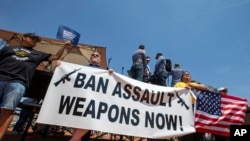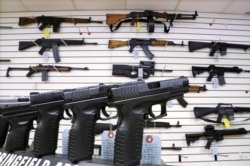Two horrific mass shootings in the United States that killed 31 people have set the stage for a titanic political and legislative fight in Washington over gun control, for decades an intractable issue that the country's elected leaders have often argued about but seldom reached consensus on.
U.S. President Donald Trump left the nation's capital Wednesday for visits to the Midwest city of Dayton, Ohio, and the southwestern border city of El Paso, Texas, the communities where last weekend's slaughters played out.
Trump said that he supported background checks for gun buyers that his Republican colleagues in Congress have blocked in the past, but that he saw "no political appetite" for a ban on the sale of assault weapons like those the gunmen deployed in the country's latest carnage.
Several 2020 Democratic presidential candidates have said they want to outlaw the sale of the high-capacity firearms to the American public. Sales of some assault weapons and some high-capacity magazines were barred under federal law from 1994 to 2004; the ban then expired and was not renewed.
Trump did not spell out what kind of gun buyer background checks he would support. After a previous mass killing — when 17 students and teachers were gunned down in 2018 at a Florida high school — he also said he supported background checks, but then backed off in the face of opposition from the country's main gun lobby, the National Rifle Association.
In the immediate aftermath of the killing of innocents and the wounding of dozens more in Texas and Ohio, lawmakers voiced wide support for a "red flag" bill. That legislation, also backed by Trump, would allow local authorities across the country, after judicial review, to confiscate guns from those who pose an immediate risk of endangering themselves or others.
Suicide prevention
But some gun analysts say such red flag laws — also known as "extreme risk protection orders" — might do more to prevent suicides than the mass shootings that this week have alarmed the United States, a country where the Constitution's Second Amendment guarantees an individual's right to own a gun.
More sweeping gun control legislation than a red flag bill could quickly encounter headwinds in Congress.
The Democratic-controlled House of Representatives approved more ambitious gun control bills in February, requiring background checks for all gun buyers, including those who make purchases online or at gun shows. The proposed legislation also would extend waiting periods for further review of would-be gun buyers whose names were flagged in the country's instant check system.
But the measures have not even been debated in the Republican-led Senate, where Majority Leader Mitch McConnell says he opposes the legislation.
The El Paso and Dayton attacks have generated new demands — mostly from Democrats and a few Republicans — for congressional action, and specifically for McConnell to allow a Senate vote on the House-passed legislation.
One Democratic presidential contender, Representative Tim Ryan of Ohio, assailed McConnell for blocking the gun control measures, saying, "Enough, Mitch McConnell. Get off your ass and get something done." He said people were getting killed in the streets and that nobody was acting.
Committee work
McConnell says he has directed three Senate committee chairmen to begin work on gun-related legislation that could draw support from Republican and Democratic lawmakers alike and be signed into law by Trump. The shape of such legislation is uncertain.
Trump told reporters, "There's a very strong appetite for background checks. We're going to do something like we've never done. I'm all in favor of it."
Trump said he would be able "to convince people to do things" they have opposed in the past. "I have a lot of influence," he said.
He drew the line at calls by Democratic presidential contenders for a ban on semiautomatic assault weapons. Attempts to reinstate the country's previous ban have failed.
An assault weapon was deployed by Connor Betts, 24, a community college student, to fire off 41 shots in less than 30 seconds. He killed nine people in Dayton, including his sister, and wounded another 27 before police killed him.
Authorities in El Paso have accused Patrick Crusius, 21, a white nationalist targeting Hispanics he said had invaded Texas, of using a similar weapon to kill 22 people at a Walmart store in El Paso and injure two dozen. He has been jailed and faces murder charges for which, if convicted, he could be executed.
Trump said that while there appeared to be wide political support for background checks for gun buyers, "I've not seen that with regard to [banning] certain types of weapons."
Buy-back program
Former Vice President Joe Biden, the leading Democratic presidential contender according to national polls, this week told CNN that if he defeated Trump next year, he would push for legislation to ban assault weapons and institute a buy-back program to try to get as many such weapons as possible off the streets.
"The fact of the matter is," Biden said, "they should be illegal, period. Look, the Second Amendment doesn't say you can't restrict the kinds of weapons people can own. You can't buy a bazooka. You can't have a flame thrower."
Biden said he knew of no way law enforcement authorities could confiscate weapons from gun owners in the U.S. "But we can, in fact, make a major effort to take [assault weapons] off the street and out of the possession of people," he said.
Other leading Democratic presidential contenders, including Senators Kamala Harris, Cory Booker and Bernie Sanders, have called for new gun control measures, with Booker saying he wanted to require licensing of the millions of gun owners in the U.S.
Sanders said, "There are estimated to be between 5 [million] and 10 million assault weapons on America's streets. Shockingly, that is more than the United States military has. The function of an assault weapon is to kill human beings as quickly as possible. We need to ban the manufacture, sale and transfer of these weapons of war. Period."
South Bend, Indiana, Mayor Pete Buttigieg, who served as a U.S. Naval Reserve officer in the U.S. conflict in Afghanistan, said this week, "Weapons like the one I carried in Afghanistan have no place on our streets or in our schools. The same is true for high-capacity magazines, some of which can hold up to 100 rounds of ammunition and significantly increase a shooter's ability to injure and kill large numbers of people quickly without needing to reload."








